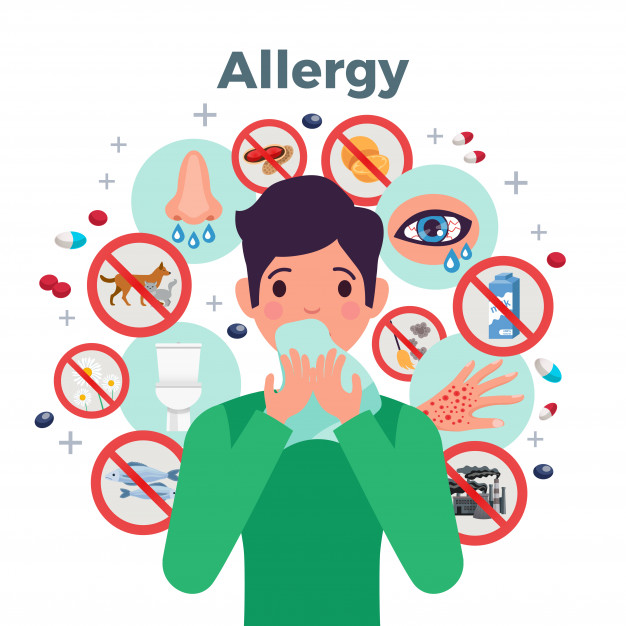Gut health & allergies are connected. However allergies should not be misunderstood as intolerances. Both are different. Milk, nuts, soy, fish & wheat are the most prominent food items that cause food allergies & are responsible for almost 90% of reactions. These allergens cause symptoms such as sneezing, blocked nose, watery eyes, swelling, abdomen pain, nausea & diarrhoea. It is important to note that not all allergens are food. Some can be inhaled as well. Pollen, dust mists & mold can cause allergic reactions such as asthma. Allergic asthma is the most common form of asthma. It causes sufferers to feel short of breath, coughing & feeling tightening sensation in the chest. The overreaction of the immune system causes airways to tighten & flood with thick mucus that makes breathing tough.
Allergies & intolerances are different medical problems since they are caused by different pathways in our bodily processes. Intolerances take longer to manifest whereas allergies cause a rapid reaction that can sometimes become deadly.
An allergy is a systemic immune reaction against a foreign invader wherein body’s disease fighting immune cells misidentify beneficial bacteria as harmful. These immune cells then attack the allergen in its effort to clear it from the body. They produce chemicals called antibodies that bind to allergen causing release of histamine which is a driving force for many symptoms of allergy. Some common symptoms of allergy include sneezing, stuffy nose, swelling, abdominal pain, nausea & diarrhoea.
Although allergic symptoms appear quickly, intolerance symptoms take around 20 hours to manifest as food moves slowly through the digestive system.
Food tolerance occurs when our body is not able to digest food properly resulting in digestive problems such as bloating, constipation & even diarrhoea. In some cases, intolerance also causes severe reactions requiring medical treatment & hospitalisation. Some of the food intolerances include:
Lactose Intolerance: This is found in around 2/3rd of Asian population & generally arises due decrease in production of protein- Lactase which is responsible for breaking down milk into lactose( sugar). You can find more details about this here . For a lot of people, production of this protein is reduced or ceases to exist when they age past childhood.
Alcohol Intolerance: Majority of Asians suffer from Alcohol tolerance with symptoms such as stuffy nose & alcohol red flushing after consuming alcohol. Red colour comes from accumulation of acetaldehyde, a toxic substance produced from breakdown of alcohol due to decreased production of protein that breaks acetaldehyde down to less toxic substances. My blog on alcohol intolerance discusses this in detail.
Gluten Sensitivity: Gluten is a protein naturally found in grains such as wheat, rye, barley & spelt. It acts as a binder which holds food together & adding a stretching quality. Other grains that contain gluten include durum, wheat berries, semolina, farina & khorasan wheat. Oats- though naturally are gluten free- often contain gluten from cross contamination since oats are processed in the same facilities as the other grains listed above. Less obvious sources of gluten include modified food starch, soy sauce, lecithin & MSG.
Gluten is mostly associated with wheat & wheat containing foods that are abundant in our food supply. Issues related to gluten are associated with problems in digesting these grains. Coeliac disease is an extreme form of gluten intolerance which requires us to quit all the foods that contain gluten. These include bread, cereals & pasta. Our genetic makeup has a lot to do with our predisposition to gluten. You can find more details about genetic risk to consuming gluten here.
People suffering from celiac disease experience autoimmune inflammation in the small intestine triggered by gluten wherein our immune system attacks the body itself. If left untreated this can lead to more serious medical issues such as chronic fatigue, infertility & osteoporosis( bone health).
Gut-Allergy connection
Allergy can be diagnosed & treated with medication but we can reduce the risk of developing allergies, starting with a healthy gut. Gut microbiome consists of bacteria that live in our gut & plays an important role in maintaining our health. In Fact these bacterias have a symbiotic relationship with our body.
Healthy & diverse gut microbiome is linked to fewer allergic symptoms. It is important to note that the rate of occurrence of allergies has been rising steeply in the last few decades as humans have settled comfortably in urban environments. The food habits have become homogenised. People get outdoors less & do less exercise. Families are having fewer children & resorting to antibiotics. These antibiotics create imbalances in our gut microbiome. All these factors cause our gut to lose diversity.
Discover your personal traits & learn about your genetic predisposition to nutrition & workout Our solution will help you avoid a standard approach to fitness. By subscribing to our membership & preventive health programs, you will not only receive information about genetic response to nutrition & fitness but also be coached by an international fitness coach who will cover both genetics powered nutrition & exercise aspects of the program that will help you improve your health, meet your weight loss goals & overcome risk of diabetes.. Sign up for our membership here or download our mobile application here.


Leave a Reply